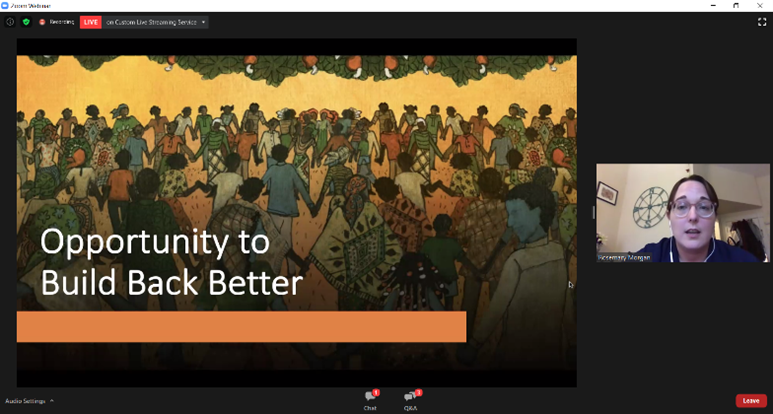Erica N. Rosser, Johns Hopkins Bloomberg School of Public Health
The Washington University Center for Women’s Infectious Disease Research and the Global Health Center joined forces to organize an important and opportune virtual event – The COVID-19: Scientific Advances and its Impact on Women’s Health Symposium. Dean of the Washington University School of Medicine David Perlmutter, opened the webinar by praising the global scientific community for their quick response to the COVID-19 pandemic. He also acknowledged the featured speakers for their work on COVID-19 and women’s health. Viewers connected by Zoom and YouTube livestream to watch leading scientists, local and global health researchers and healthcare professionals discuss the development of SARS-CoV-2, prevention, and the impact of the novel coronavirus pandemic on communities around the world. Audience engagement was made possible via the Zoom Question and Answer forum and Twitter #ScienceStopsCOVID.
Women and COVID-19: The impact on global and public health
In the final session of the symposium presenters focused on women and public health as Dr Janine Clayton, Director of the Office of Research on Women’s Health at the NIH, gave opening comments on NIH programs focusing on women’s health. She also explained reasons for the differential sex-and-gender-based outcomes observed during the pandemic.
The first keynote speaker, University of Sierra Leone, Faculty of Nursing Dean, Dr Haja Ramatulai Wurie, exposed the challenges experienced by female health workers both on-the-job and at home, and how these stressors make them particularly vulnerable to psychological injury at a time when they are already at increased risk of exposure to COVID-19 infection. She discussed the difficulties faced by women in marginalized communities (i.e. barriers to economic earning power, increased risk of domestic violence), and also shared relatable anecdotes of how the pandemic has affected gender roles even in her own home. Project Director at Save the Children International, Dr Amina Jama Mahmud then explained how the burden the pandemic puts on health systems’ ability to deliver routine services is magnified in fragile states like Somalia. She shared findings from recent studies indicating that national gains in maternal and child health indicators have been jeopardized by the restrictions imposed by the pandemic. She also expounded on the inability of gender-blind policies to appropriately address COVID-19.
From Somalia, Assistant Professor and Co-director of the Center for Health Economics and Policy, Institute for Public Health at Washington University, Dr Karen Joynt Maddox brought us back to St. Louis with a data-filled presentation on the inequitable ways in which COVID-19 has impacted historically disadvantaged communities. She argued that we need to re-examine existing policies with an eye to combatting the higher risk of morbidities that minorities face. Sonia Deal, Assistant Vice President of Clinical Integration at Affinia Healthcare, followed with a presentation on community engagement in St. Louis during COVID-19. Ms Deal discussed how Affinia has responded to community needs during the pandemic by adapting to provide healthcare (i.e. community testing, telehealth appointments) and other social services (i.e. partnering with local foodbank) to communities in need.
Final keynote speaker and Assistant Scientist at the Johns Hopkins School of Public Health, Dr Rosemary Morgan, gave a strong closing with her presentation on the need to recognize and address the differential impacts of COVID-19 across the gender spectrum. She framed the impacts in terms of the primary short-term impacts (i.e. morbidity and mortality), versus the secondary long-term effects (i.e. social, economic, and security) that impact women more, and advocated for better female representation in health policy development as an important step of a Gender Responsive Pandemic Plan that would allow countries to “build back better”.
SARS-CoV-2 Pathogenesis, Treatment and Prevention
The symposium also featured a series of fascinating presentations on COVID-19 basic science research covering topics including: a historical review of coronavirus research; convalescent plasma; the role of theSARS-CoV-2 spike glycoprotein in immunity; and research on a “replication competent” vesicular stomatitis virus (VSV) that could help to advance work on a COVID-19 vaccine.
The symposium concluded by encouraging the global scientific and public health communities to look to the future as Washington University professors Dr Caline Mattar and Dr Carolina Lopez, moderated a panel of distinguished speakers. Yale University Professor, Akiko Iwasaki Washington University Professor George Kyei and Johns Hopkins School of Public Health Professor and Chair Dr Arturo Casadevall discussed the different impact of the pandemic across countries, and echoed featured speakers on the importance of supporting women in science and achieving better female representation in pandemic decision-making.
Thanks to Washington University for organizing a stimulating forum for internationally recognized experts to share their important research and work with the public. Learn more about the featured speakers and the event.






